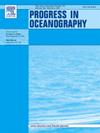Three-dimensional structure of temperature, salinity, and Velocity of the summertime Vietnamese upwelling system in the South China Sea on the interannual timescale
IF 3.8
3区 地球科学
Q1 OCEANOGRAPHY
引用次数: 0
Abstract
Summertime upwelling system off the southern Vietnamese coast is one of the most essential oceanographic features in the South China Sea. This system is divided into two regions along the coast, the Southern Coastal Upwelling (SCU; south of 12.5°N) and Northern Coastal Upwelling (NCU; north of 12.5°N), and one in the offshore area, the Offshore Upwelling (OU; east of 110°E). Utilizing the HYCOM ocean reanalysis product in the period of 1994–2015, vertical characteristics of this upwelling system on the interannual timescale are investigated. Furthermore, the omega equation is applied to reconstruct vertical velocity to quantify its intensity and clarify the corresponding leading factors in the three regions. The analysis indicates that the kinematic deformation effect is the primary contributor to coastal upwelling formation while the momentum effect plays the leading role in offshore upwelling. The SCU variability is more sensitive to the momentum effect; however, in the NCU, the kinematic deformation effect is offset by the momentum effect and the upwelling is enhanced as the kinematic deformation (momentum) effect increases (decreases). The summertime mean vertical velocities in the central areas of SCU, NCU, and OU are estimated at 0.16 m/d, −0.08 m/d, and 0.003 m/d, respectively. The vertical velocity speeds up to 0.32 m/d, 0.07 m/d, and 0.08 m/d as the strong upwelling event occurs.
南海夏季越南上升流系统在年际尺度上的温度、盐度和流速三维结构
越南南部沿海的夏季上升流系统是南海最基本的海洋特征之一。该系统沿岸分为两个区域:南部沿岸上升流(SCU,北纬 12.5 度以南)和北部沿岸上升流(NCU,北纬 12.5 度以北),以及近海区域的离岸上升流(OU,东经 110 度以东)。利用 1994-2015 年期间的 HYCOM 海洋再分析产品,研究了该上升流系统在年际时间尺度上的垂直特征。此外,还应用欧米茄方程重建了垂直速度,以量化其强度并明确三个区域的相应主导因子。分析表明,运动形变效应是沿岸上升流形成的主要因素,而动量效应在离岸上升流中起主导作用。南极科考站的变化对动量效应更为敏感;但在北 极科考站,运动形变效应被动量效应抵消,随着运动形变(动量)效应的增加(减 少),上升流增强。据估计,夏季南中国海大学、北中国海大学和华侨大学中心区域的平均垂直速度分别为 0.16 米/天、-0.08 米/天和 0.003 米/天。随着强上升流事件的发生,垂直速度分别加快到 0.32 m/d、0.07 m/d 和 0.08 m/d。
本文章由计算机程序翻译,如有差异,请以英文原文为准。
求助全文
约1分钟内获得全文
求助全文
来源期刊

Progress in Oceanography
地学-海洋学
CiteScore
7.20
自引率
4.90%
发文量
138
审稿时长
3 months
期刊介绍:
Progress in Oceanography publishes the longer, more comprehensive papers that most oceanographers feel are necessary, on occasion, to do justice to their work. Contributions are generally either a review of an aspect of oceanography or a treatise on an expanding oceanographic subject. The articles cover the entire spectrum of disciplines within the science of oceanography. Occasionally volumes are devoted to collections of papers and conference proceedings of exceptional interest. Essential reading for all oceanographers.
 求助内容:
求助内容: 应助结果提醒方式:
应助结果提醒方式:


